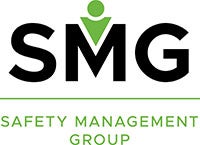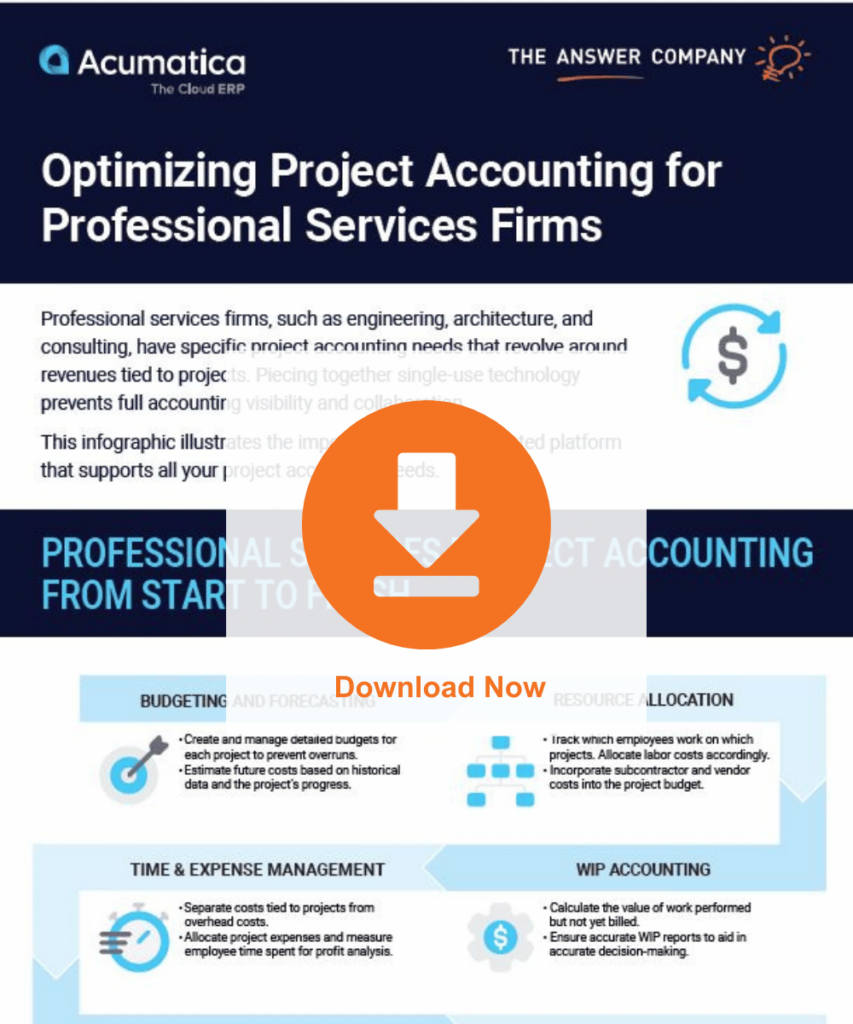
Project Accounting: The Silent Profit–Killer
Project accounting should be straightforward: track costs, bill clients, and recognize revenue. But for many professional services firms, it’s anything but. Manual invoicing, inconsistent time tracking, and unreliable reporting create a constant struggle to stay on top of project financials. And when profitability depends on getting it right, inefficiencies are more than just an inconvenience—they’re a financial risk.
The good news? With the right approach, you can take control of your project accounting and eliminate the bottlenecks holding your firm back. In this post, we’ll walk through the key challenges, their impact on your business, and how modern cloud solutions can help you achieve real-time financial clarity and improved profitability.
Signs Your Project Accounting Process is Holding You Back
If your firm is experiencing any of these issues, chances are your project accounting process isn’t working as well as it should:
- Inconsistent time and expense tracking: Billable hours slip through the cracks when employees forget to log their time, leading to revenue loss.
- Difficulty in tracking and allocating project costs: Relying on spreadsheets or disconnected systems makes it challenging to distinguish project costs from overhead expenses.
- Manual invoicing and revenue recognition: Finance teams chasing down data from project managers before sending invoices slow down cash flow and increase errors.
- Lack of real-time insight into project profitability: Waiting until month-end to analyze financials means operating reactively, with cost overruns and missed billable hours already impacting margins.
Sound familiar? These aren’t just administrative headaches—they directly impact your firm’s bottom line.
Get the “Optimizing Project Accounting for Professional Services Firms Infographic” for quick strategies to optimize your financial management. (Instant download, No form fill required)

The Answer Company Advantage
The Answer Company empowers professional services firms to take control of operations with modern cloud ERP. We help replace disconnected tools with streamlined systems that drive growth, efficiency, and financial clarity.
As Acumatica’s #1 Canadian partner, we guide you from implementation to long-term success—so you can focus on delivering exceptional service, not managing outdated systems.
30+
Years of Experience
3000+
Digital Transformations
The Business Impact of Inefficient Project Accounting
SPI Research’s “18th Annual Professional Services Maturity™ Benchmark Report”, found that revenue growth in professional services firms has slowed to 4.6% in 2024, compared to 7.8% in 2023, well below the five-year average of 8.7% (SPI Research, 2024). This decline suggests firms are facing greater financial pressures, making real-time project accounting and financial visibility more critical than ever.
Inefficiencies in project accounting can have serious financial consequences:
- Delayed invoicing leads to cash flow problems – Professional services firms experience an average 45-day delay in invoice payments, significantly impacting cash flow and profitability (SPI Research, 2023).
- Budget overruns hurt profitability – Nearly 30% of projects exceed their initial budget due to poor financial visibility (Project Management Institute, 2023).
- Forecasting becomes a guessing game – Without access to accurate, up-to-date financial data, planning future projects and resource allocation is based on gut instinct rather than real numbers.
Every inefficiency compounds over time. But modern technology can eliminate these roadblocks and put your firm back in control.

“We have a workforce hungry for KPIs and metrics and Acumatica provides our employees and upper management with actionable data at their fingertips.”
—Rebecca Ogle, CFO, Safety Management Group
The Path to a Streamlined Project Accounting Process
Transitioning from chaotic, reactive accounting to a streamlined, proactive approach begins with leveraging the right tools and technology. An optimized project accounting system should include:
- Automated time and expense tracking: Facilitates easy logging of time from any device, ensuring accurate capture of billable hours.
- Real-time project financials: Provides instant visibility into project costs, profitability, and resource utilization for informed decision-making.
- Work-in-Progress (WIP) accounting: Accurately tracks revenue earned versus costs incurred to prevent cash flow disruptions.
- Flexible billing methods: Supports various invoicing models, including time-and-material, fixed-fee, or milestone-based billing.
- Cloud-based accessibility: Ensures finance teams, project managers, and executives have access to up-to-date financials anytime, anywhere.
This level of automation and integration is essential for professional services firms aiming to scale efficiently and maximize profitability.
Why Professional Services Firms Are Moving to Cloud ERP
Key Benefits of a Cloud ERP for Project Accounting:
- Eliminates manual data entry and reduces errors
- Gives project managers real-time financial visibility
- Automates revenue recognition and invoicing
- Enables seamless collaboration between finance and project teams
- Improves forecasting and resource planning
Firms that have integrated AI for resource planning and financial automation are outperforming their competitors (SPI Research, 2024). AI-driven project accounting can predict cost overruns, optimize staffing, and automate revenue recognition, allowing firms to improve profitability without adding administrative burden.
Solutions like Acumatica Professional Services Edition bring all these benefits together, offering an intuitive, cloud-based platform designed specifically for project-based firms. By centralizing financials, billing, and project data in one system, firms can move from reactive problem-solving to proactive financial management—a game-changer for long-term profitability.
Is It Time to Upgrade Your Project Accounting?
If your firm continues to grapple with manual invoicing, disconnected systems, and limited financial visibility, it’s time to consider a more effective approach. Cloud-based project accounting solutions offer the automation and real-time insights necessary to keep projects on track, maximize billable hours, and enhance cash flow.
Firms that embrace these modern solutions are poised to outperform competitors, boost profitability, and future-proof their operations.
The success of professional services firms hinges on accurate project accounting, optimized resource management, and real-time financial tracking. Firms that embrace automation, AI, and cloud ERP will be better positioned to:
- Boost profitability by reducing revenue leakage.
- Improve utilization rates by optimizing billable hours.
- Enhance client satisfaction by delivering projects on time and within budget.
FAQs Project Accounting for Professional ServicesFAQs
Find answers about project accounting for professional services firms. Dive into our easy-to-use FAQ section, where we’ve gathered all the info you need.
Project accounting tracks financials at the project level rather than just at the company level. It ensures that all revenue, expenses, and profits are directly tied to specific projects, allowing firms to monitor profitability, resource allocation, and budget adherence more accurately.
Professional services firms operate on a project-by-project basis, making it critical to track costs, revenue, and profitability per project. Project accounting helps firms optimize billable hours, manage cash flow, and prevent cost overruns, ensuring sustainable profitability.
Some of the most common challenges include:
- Inaccurate time tracking leading to revenue leakage
- Delayed invoicing affecting cash flow
- Difficulty in forecasting project costs and profitability
- Managing multiple billing models (fixed-fee, milestone-based, T&M)
- Lack of real-time financial visibility across projects
When project financials are not tracked accurately, firms experience:
- Budget overruns that eat into margins
- Missed billable hours, leading to lost revenue
- Delayed invoicing, which slows down cash flow and frustrates customers
- Poor financial forecasting, making it harder to plan for future growth
- Time & Materials (T&M): Clients are billed based on actual time worked and expenses incurred.
- Fixed-Fee: A set price is agreed upon for the entire project, regardless of actual costs.
- Milestone-Based: Payments are tied to project progress, such as phase completions.
- Retainer-Based: Clients pay a recurring fee for ongoing services.
Cloud-based ERP solutions designed for project-based companies, like Acumatica, integrate project accounting with financial management, time tracking, billing, and resource planning. This eliminates data silos, improves financial visibility, and automates invoicing and revenue recognition, leading to better financial control.
- AI can predict budget overruns and optimize resource allocation.
- Automation reduces manual work by auto-generating invoices and recognizing revenue in real time.
- Firms using AI for financial processes outperform competitors in efficiency and profitability (SPI Research, 2024).
Real-time tracking enables firms to:
- Monitor project costs as they occur, preventing overruns.
- Adjust budgets proactively instead of reacting too late.
- Ensure invoices are accurate and sent promptly, improving cash flow.
An ERP system integrates time tracking, expense reporting, and invoicing, ensuring all billable hours and project-related costs are accounted for. This prevents missed revenue opportunities caused by manual errors or lost data.
To improve biliable utilization rates, firms should consider implementing an ERP to:
- Use automated time tracking to capture all billable hours.
- Optimize resource scheduling to ensure the right people are assigned to the right projects.
- Automate non-billable administrative tasks to free up staff for revenue-generating work.
- Send invoices faster by automating billing workflows.
- Use milestone-based billing instead of waiting until project completion.
- Monitor Accounts Receivable metrics closely and follow up on overdue payments.
- Reduce scope creep by properly tracking project costs and contract terms.
WIP accounting ensures revenue is recognized as work is completed, rather than only when the project is finished. This:
- Improves cash flow predictability.
- Allows for more accurate financial forecasting.
- Helps identify unbilled work that should be invoiced.
- Implement real-time cost tracking to monitor project expenses as they occur.
- Compare budget vs. actual costs continuously.
- Use customized financial dashboards to review profitability metrics for each project.
- Automate revenue recognition to ensure accurate financial reporting.
- Use AI-powered forecasting to predict financial risks before they occur.
- Set up automated alerts for potential cost overruns.
- Integrate project accounting with resource planning to avoid staffing inefficiencies.
- Maintain real-time financial dashboards to track budget performance.
Related Resources




